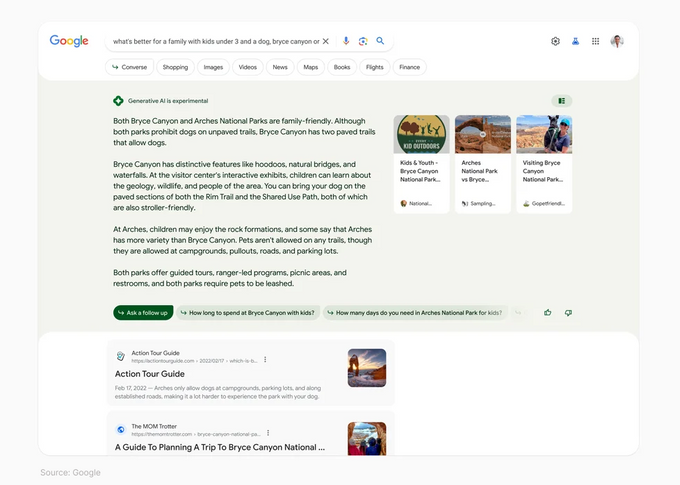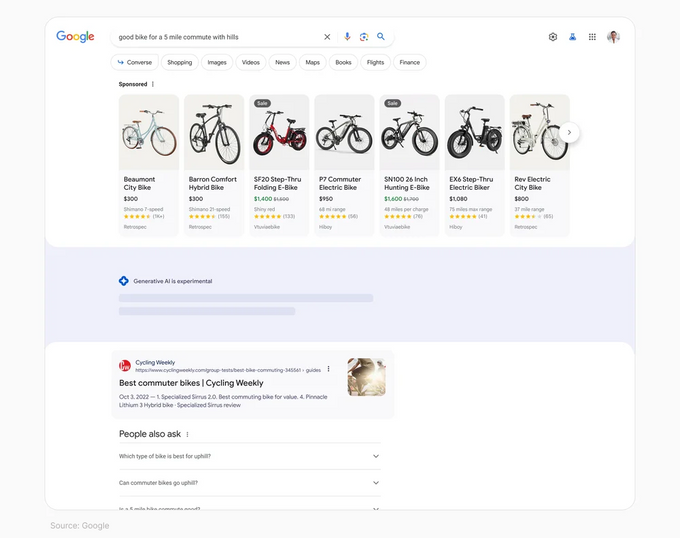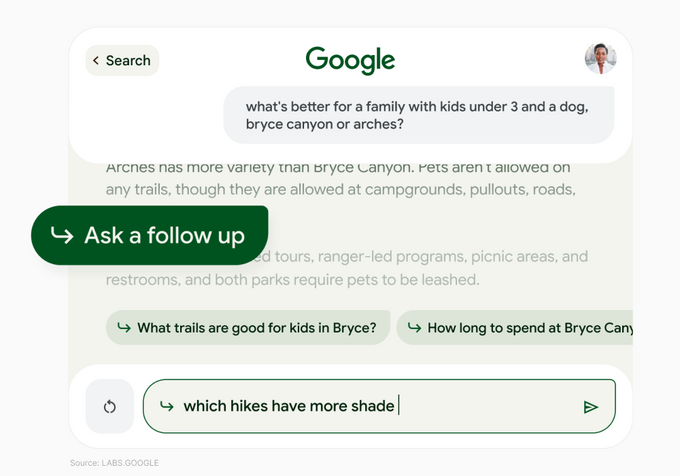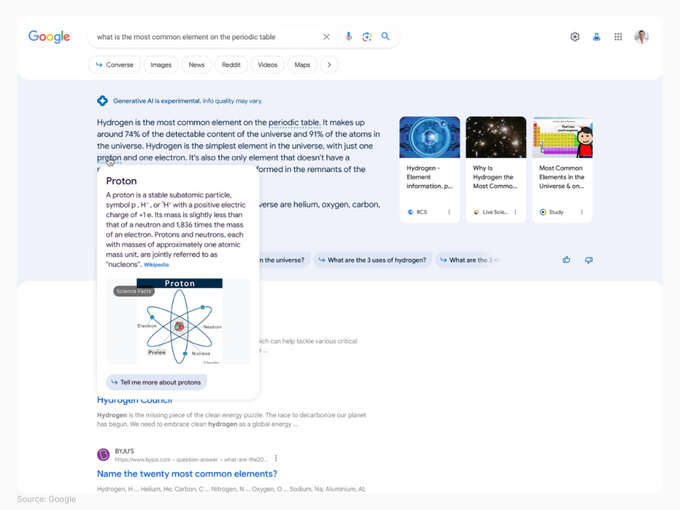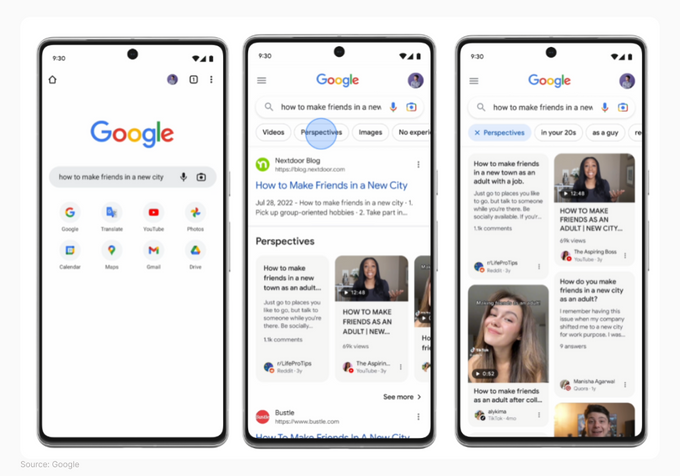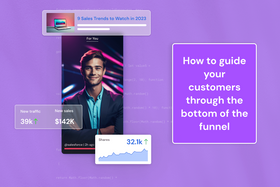Google Search is changing—Here's how to stay ahead
With Google using AI to reinvent Search, now is the time to rethink your approach if you want to stay discoverable.
Updated June 13, 2025

AI Summary
Key takeaways
- Google is experimenting with AI to provide more conversational, intuitive search experiences.
- Google's focus is providing high-quality search results, generating ad revenue, and sustaining website traffic.
- Future-proof your content by adopting Google's objectives and prioritizing user experience.
Google recently announced an experimental feature called Search Generative Experience (SGE) that integrates AI similar to ChatGPT directly into search results to offer users more nuanced and conversational search experiences.
This new way of searching prompts some questions: What does this development mean for the future of Search? How should brands and content creators respond to stay relevant?
Let's look at some key implications of SGE and how best to prepare for the upcoming changes.
» Stay ahead of Google with AI-driven content strategy software
Google Search is getting smarter
Don't know the answer to something? Just google it.
That has been the standard response for finding information online. This is because Google has always dominated search, receiving over 90% of user traffic out of the major search engines.
But AI platforms like ChatGPT have forced Google to innovate by changing how we search. Google's aim with SGE is to keep up with user demand and provide a better search experience.
Users can now search like never before, but where does that leave your brand?
Instead of trying to figure out what's happening now, it's better to look ahead and determine what Google actually wants to achieve with these changes. Knowing where Google is headed and what their goals are helps us to prepare for what might come next.
» Learn about Google's AI Overviews and how to optimize for them.
Google's core priorities remain unchanged
Google's algorithms may change quite often, but their priorities have always been the same:
- Provide the best search results
- Generate revenue
- Send traffic to the internet
These priorities are largely guiding what Google is testing with SGE. Here's how:
Providing the best search results
Google is testing whether SGE can deliver high-quality search results. Google uses tracking and analytics to understand user behavior, like whether users find what they're searching for and how often they continue to search after receiving initial results.
This data, collected from various devices and platforms, helps Google assess the effectiveness of SGE in meeting users' needs.
READ MORE: ChatGPT search vs. Google: What’s the difference?
Monetization and ad performance
Google is analyzing how ads are integrated and interacted with in SGE to see if the new format affects ad clicks.
It's important that the monetization strategy aligns with the new search experience without compromising its efficiency.
Driving traffic to websites
Google and content creators exist in a mutually beneficial partnership. Creators optimize their content so Google can direct visitors to their sites. In return, Google search provides the audience and traffic creators need to succeed.
If Google ever fails to uphold its end by stopping visitor referrals, creators will turn to other platforms or search engines. Over time, the lack of incoming creator content would leave Google search results bare and lacking substance.
SEE ALSO: What zero-click searches mean for your SEO strategy
3 notable changes coming to Search
1. Integration of a chat-like experience
Google is adapting to users' preference towards conversational AI interfaces, such as ChatGPT. They aim to provide quick and accurate answers to queries. This development needs to balance chat features with website traffic and monetization through ads.
» Compare Google Gemini vs. ChatGPT and find out which chatbot is better.
2. Decrease in traditional clicks
SGE's AI snapshot may decrease the number of clicks on regular search results. The nature of Google's search result pages will continue to change as they learn what makes for a more engaging search experience.
Because of this, it might be time to reconsider what "best results" means based on user preferences and behaviors. When it comes to search results pages, you have less control over how your brand is presented than you do on your website.
It's like a marketplace where you have to work with a predefined structure. This means that it's important to differentiate and optimize your brand to stand out.
Traffic still goes to websites for now, but as Google becomes more self-contained, the amount of traffic is at risk.
3. Shift towards more video and social media-like content
Video content, particularly short-form videos for social media, is becoming more popular. From what we've seen in their Perspectives update, Google may integrate more social media-style content into its search results to keep up with user preferences and remain competitive. This could be a strategic response to these formats' growing influence on how people consume information.
How to prepare for changes coming to Search
- Embrace video content: Prioritize video to align with user preferences and Google's increased focus on video-based search. Transition to a video-first content strategy.
- Offer unique perspectives: Provide distinctive viewpoints using platforms like TikTok. This aligns with Google's transition to spotlighting diverse perspectives.
- Focus on the essence of Google's objectives: Keep in mind Google's long-standing mission to provide value to searchers rather than reacting to shifting algorithms. Create high-value content that directly answers user queries.
» Learn how to monetize your expertise with video
Looking to the future
As Google Search continues its AI-driven evolution, the path forward is clear: we must adapt or risk being left behind. By embracing video content, providing unique perspectives, optimizing for user intent over algorithms, and ultimately prioritizing customer value above all, we can remain relevant and discoverable.
Though some of these changes may seem daunting, they promise a future where discovering and accessing information is more streamlined than ever.
